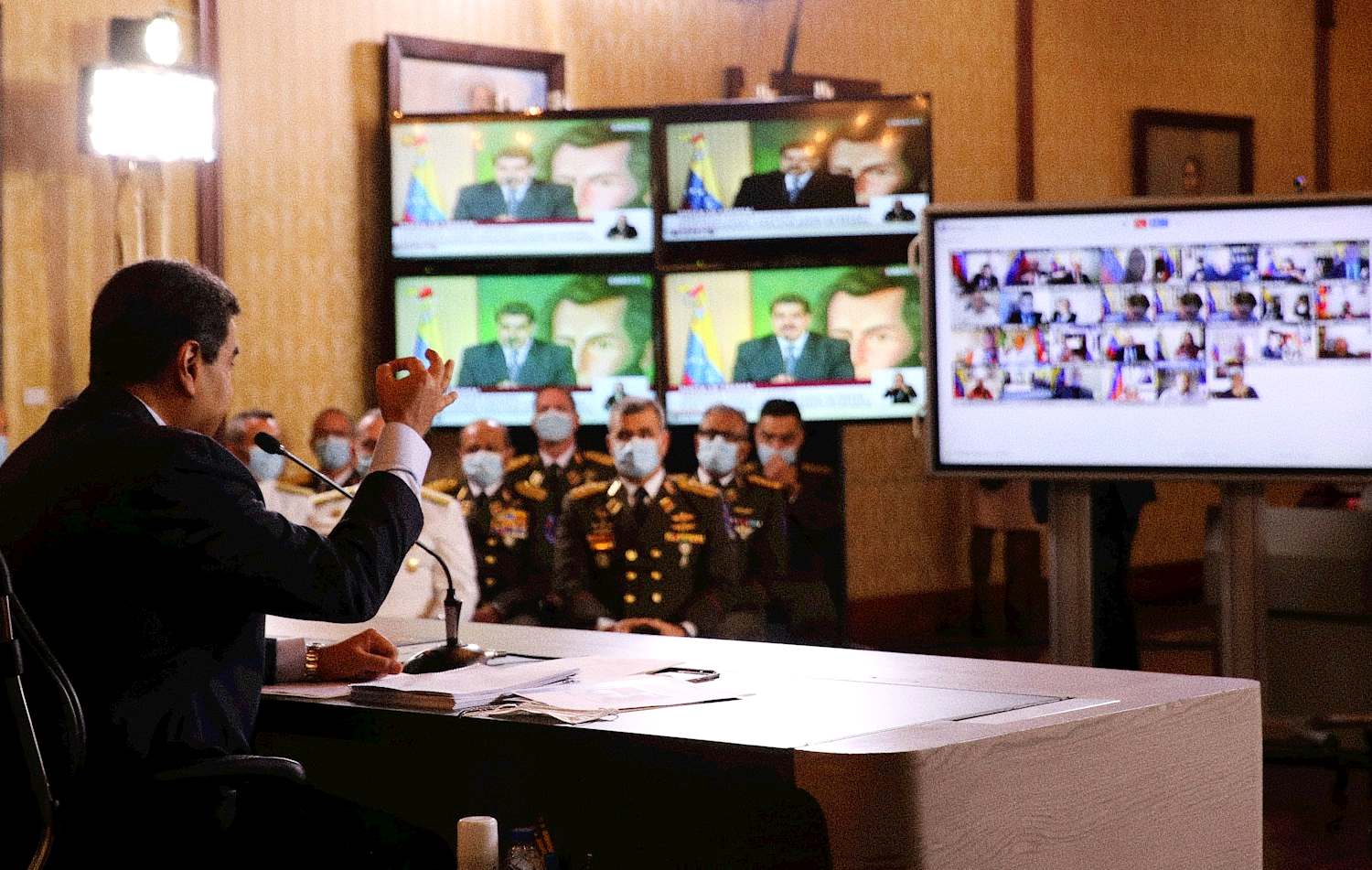
The following chronicle is armed with the testimonies of four key sources, documents that the PanAm Post had access to, and articles published in The Washington Post and AP:
There was a draft plan to capture Nicolás Maduro. It consisted of a surgical operation, with the desire to be clean, which involved the infiltration of military cells into Venezuela. An extensive 42-page document details, step by step, the development of the endeavor. However, this operation was only briefly discussed by the parties. It began at a meeting in early fall in an apartment in Miami’s financial center and ended, aggressively, in the same apartment on November 8.
Almost six months after one of the parties threatened the other, the operation was executed arbitrarily. “We want to make it public and report to the national and international community that in the early hours today, May 3, 2020, a group of terrorist mercenaries attempted to carry out an invasion by sea,” said the Chavista Minister of the Interior Relations and Justice, Néstor Reverol, almost at midday of that Sunday.
A couple of hours after Reverol’s address, a video appeared on social media: Captain Javier Nieto Quintero of the Bolivarian National Guard, one of the first victims of the Chavista purges in the military world, well-respected and admired, appeared alongside Jordan Goudreau, a U.S. mercenary and the owner of the private security agency Silvercorp, claiming credit not only for the maritime incursion that the regime had managed to thwart but also for future operations.
Goudreau was, as he made clear on that same night of Sunday, May 3, one of the parties to the agreement that was contrived in the fall of 2019. This agreement was abruptly suspended on November 8 during an aggressive discussion. Although the whole operation was planned under the strict terms of two confidentiality agreements, the American decided to reveal everything to the media.
In an interview with Venezuelan journalist Patricia Poleo for Factores de Poder, Goudreau gave details and permitted the publication of an ostensible eight-page contract signed by President Juan Guaidó, his strategist JJ Rendón, and Deputy Sergio Vergara. When justifying the clear breach of the agreement and the sensitive disclosure of a military operation, Goudreau argued that he was doing this to protect his men on the ground and to expose the alleged betrayal. According to Goudreau, Guaidó had breached the contract because he did not pay for Silvercorp’s services.
The rest of the story is such: the operation was completely botched by Chavismo and the other men, who set out to raid Venezuela, even though the regime was already aware of it. The operation fell apart. It was flagged as such: a suicide operation. Nobody understood it. The feeling was that whoever sponsored the operation was sending his men to the slaughterhouse.
But an event that occurred a couple of weeks earlier explains the nature of the rustic and clumsy operation. An extortion attempt that did not end well. However, that was only the latest of many signs that were already alerting all parties. In fact, there are many elements that account for the irregularities that now cloud these first days of May as well as everything related to the development of the negotiations. We have to go back months. When the protagonists of the story devised and dismantled the plan to capture Maduro. At one point, this operation seemed to be on the verge of being sealed but was eventually foiled – and yet it was executed in a series of ploys that looked more like a kamikaze scheme than a real attempt to overthrow the Chavista regime.
The preparations
The heat was unbearable in Cúcuta. It always is. But on that day, February 22, 2019, it was particularly scorching. Miguel Bosé and Silvestre Dangond had already been on the stage. Richard Branson, the organizer of the mega-concert for Venezuela, was speaking. Behind him, stood the main security guard of the event: Jordan Goudreau, a former U.S. military serviceman with a seemingly impeccable record, who, in 2018, founded the private security company Silvercorp USA.
According to a report by the Associated Press, Jordan Goudreau took an active interest in the Venezuelan cause after the Cúcuta concert that ended the failed attempt to bring humanitarian aid to the country ruled by Nicolás Maduro. So Goudreau attended a couple of events organized by Venezuelans in the United States. At one of these events in Miami, he met Lester Toledo.
Toledo listened to Goudreau carefully. All the exploits of the former Green Beret. His experiences in Iraq and Afghanistan, the three accolades for his laudable courage, the services offered by his security company, and the alleged direct relations he had with Donald Trump’s White House. He was the man, and Toledo introduced him to Leopoldo López.
The first time the famous strategist Juan José Rendón, or JJ, met Goudreau was on September 5. JJ Rendón had just been appointed by President Juan Guaidó as a member of the interim government’s Strategy Committee. His objective was to design the strategy to conquer what, at that time, was Guaidó’s first objective: the end of usurpation. And, to that end, “all options were on the table:” A. whatever happened to a national emergency government was the responsibility of the interim. B. also, an alliance with the international community. But C. it was the responsibility of the newly appointed Committee.
Many alternatives were explored. All were submitted to an extensive legal team of more than ten lawyers. The Strategy Committee studied more than ten cases of tried and tested operations in history that were either successful or complete disasters. From the Bay of Pigs to African adventures to the Eichmann case in Argentina. Finally, meetings were held with companies to study the operations. One of them was Jordan Goudreau’s.
The person who introduced the mercenary to JJ Rendón was retired Bolivarian National Guard captain Rodney Pacheco, who had become a sort of aide to President Juan Guaidó. At that first meeting, in Rendón’s apartment in Miami, there were three signings: a confidentiality agreement, a letter of intent, and a memorandum of understanding. This happened in the presence of Pacheco, Congressman Sergio Vergara, Goudreau, and Rendón.
From that first meeting, they continued to explore options with the company Silvercorp. “Everything looked very professional. Goudreau presented himself as an American military figure, honest and impeccable, with very high connections to the Trump administration,” says one of the sources. The Silvercorp website looked extremely professional. They were dealing with an expert.
It was the price and the possibility of financing that prompted the Strategy Committee to choose Silvercorp. As we read in The Washington Post, other security companies were charging up to 400 million USD. Goudreau’s, on the other hand, charged only about 212 million USD for the entire operation, plus some future privileges.
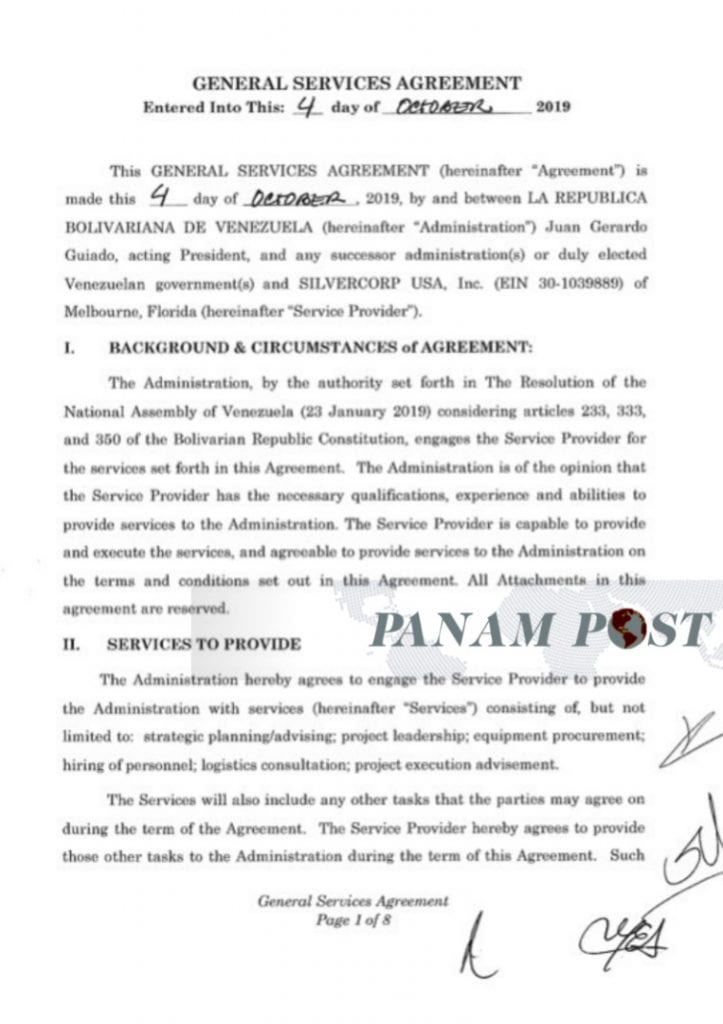
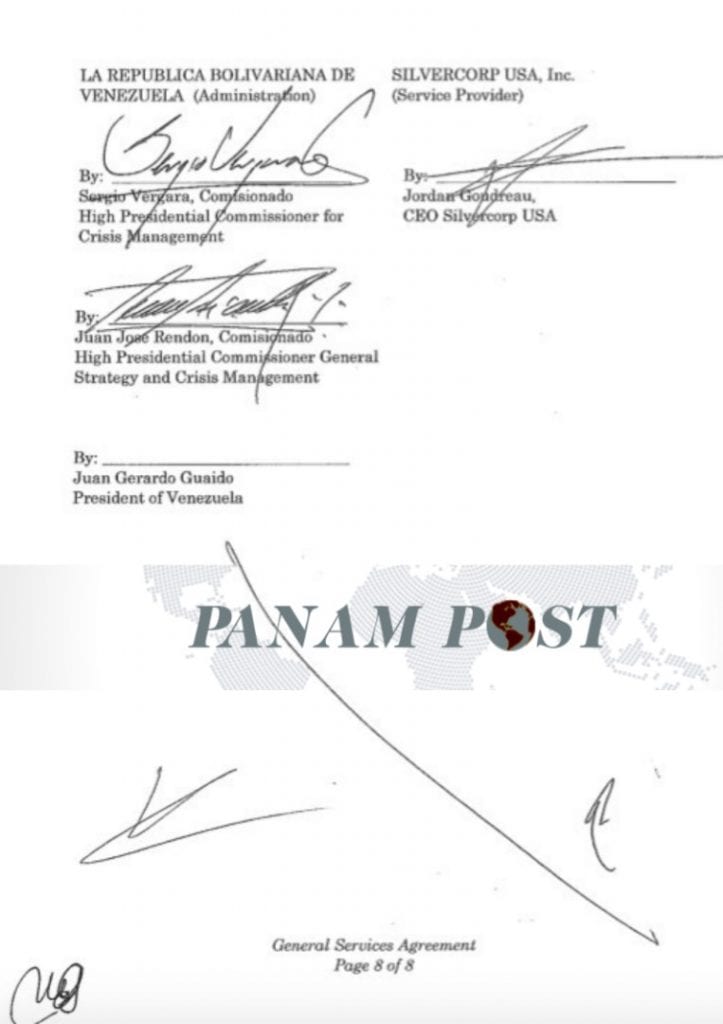
Both parties, the interim government, and Goudreau, developed the final document of the operation. They took all the factors into account: how it was to be carried out, what weapons were to be used, what was to be avoided, and what was to be done, at what risk and with what guarantees. In the end, after more than five meetings, the final service agreement was outlined. It was revealed by The Washington Post: Silvercorp was to capture, detain -or, if necessary, remove- Nicolás Maduro (who was the “prime objective”) and Diosdado Cabello, in a clean operation which would try to avoid the use of explosives or any weaponry that would produce collateral damage; 800 men were supposed to be on the job. They were to infiltrate cautiously first, and could only fire when faced with the imminent threat, the enemy’s attack, or the need to secure specific targets.
Among the clauses of the contract, it was estimated that the cost of the operation would be 212 million USD and that it would last 492 days (from the moment of signing to the achievement of the objective). The first advance of 1.5 million USD would be paid by the Interim Government within five days of signing the agreement, and the full amount of the agreement would be paid one month after the completion of the mission. Oil, money seized from Chavistas, and other privileges would also cover part of the payment.
Although the agreement reads that the Committee would pay the first advance, Jordan Goudreau vowed to get the back-up himself. He would need to gauge the potential financiers, and for that, he said, he would need an agreement signed by the interim government. Finally, in Washington DC, on October 16, 2019, Sergio Vergara, as presidential high commissioner, Rendón, as a presidential strategist, and Jordan Goudreau, as CEO of Silvercorp, signed the document.
According to JJ Rendón, Juan Guaidó didn’t sign. However, Jordan Goudreau’s side and those who connected to him, claim that the American required, most importantly, the signature of the president. Additionally, Goudreau gave the Washington Post and journalist Patricia Poleo a secret recording in which Guaidó is heard saying, “I’m going to sign.” A source told the PanAm Post that he saw Guaidó’s signature on the document. “I don’t think it was forged,” he said.
When Goudreau claimed that he needed the signed agreement to raise funds, the interim government put it on hold. The Strategy Committee had made a few attempts to test some entrepreneurs, and the answers in absolutely all cases were negative. “They came to me, and I preferred to opt-out. I supported the initiative, but it was risky,” one of the businessmen consulted told the PanAm Post.
Five days after the agreement was signed, Goudreau told them that he had managed to receive funding but could not show any evidence. It was the first red flag. Then came the demand that severed relations: the American began to ask the interim government for the final part of the down payment, as it appeared in the agreement. The Committee alluded to the fact that this was not what was agreed upon, that it did not have the money, nor had Goudreau managed to get resources to finance the operation. Jordan, according to three sources, began to behave hostilely about the debt he was claiming. Because of the pressure, JJ Rendón took the initiative to give a small advance of 50,000 USD to Silvercorp. The money came out of the strategist’s own pocket. The objective was to mitigate Goudreau’s exasperation and to help him sustain the trips through which he would pursue financiers.
But Goudreau kept pushing. He even threatened JJ Rendón: “I have screwed up your credibility in Washington DC.” The mercenary told the strategist that his participation in the operation could cost him his asylum status in the United States.
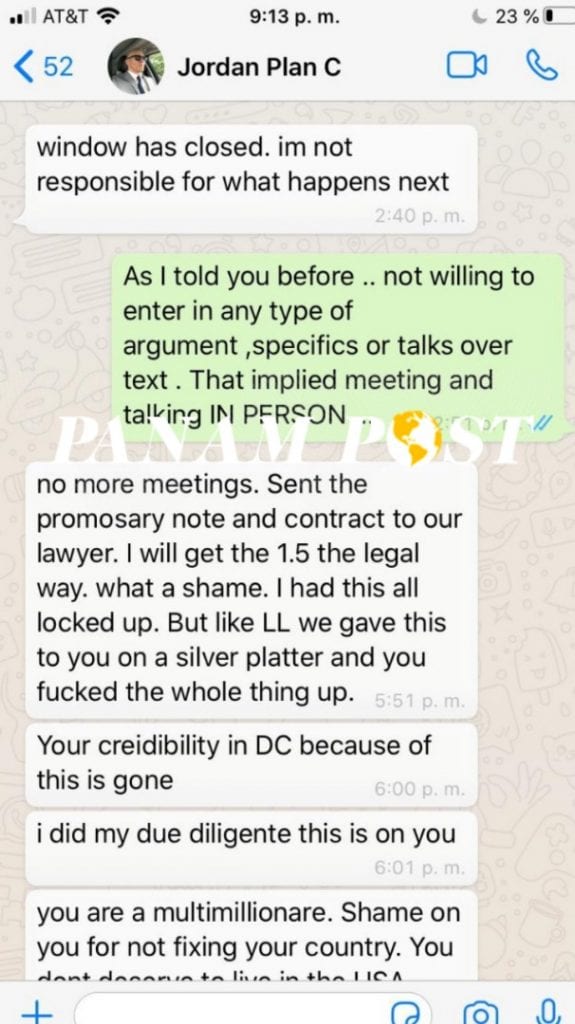
Given the hostility, it was already evident that the relationships were not equal. The Committee began to see signs that it was all a scam. Moreover, JJ Rendón says that he learned of the close relationship between Jordan Goudreau and the Chavista military.
Clíver Alcalá, now a drug trafficker imprisoned in the United States, met Goudreau thanks to Lester Toledo, according to the Associated Press. None of the sources consulted certified this information. However, Goudreau and Toledo indeed met in Bogotá.
The discord reached a climax on November 8, 2019, at a meeting in JJ Rendón’s apartment. There were more than six people at the meeting, and all of them saw a discussion that almost turned violent. “Jordan came to the apartment very upset, complaining about the alleged breach of the agreement. He demanded payment immediately, or he would screw everything up,” one of the witnesses told the PanAm Post. JJ Rendón told the PanAm Post that he demanded an apology from Goudreau for threatening him earlier. That triggered the argument.
At one point, Goudreau boasted that he had relations with Chavista businessmen. He mentioned Rafael Ramírez and Raúl Gorrín. “I will join them if I have to. Whoever pays is in charge,” he said. JJ Rendón, according to two witnesses confirmed by the PanAm Post, told the mercenary, “We are not going to be taking money from Chavismo!”.
Goudreau suggested to the strategist that he sell a property to make the down payment. He was desperate for money. “He had been almost bankrupted by this operation. He needed the money. Besides, he had men in camps in Colombia who were having a really bad time,” said one of the witnesses.
The Venezuelans present there had to intervene to avoid a violent clash. Some were soldiers, like Rodney Pacheco and Captain Javier Nieto Quintero, who, that day, had the first brush with the operation. They asked the American to calm down and the part of the interim government, which, despite everything indicating that it was willing to abandon the operation, to reconsider.
But in the end, JJ Rendón threw Jordan Goudreau out of his apartment. That was the last time they saw each other. That day, according to JJ Rendón, it was clear that the operation “was dead.”
The soldiers on their own
Former U.S. Navy Seal Ephraim Mattos told the Associated Press he visited Goudreau’s training camps in Colombia after hearing about them from a friend. When he arrived, “he was surprised by the barren conditions.” “There was no running water, and men were sleeping on the floors, skipping meals and training with sawed-off broomsticks in place of assault rifles,” said Mattos. He added, “You are not going to take out Maduro with 300 hungry, untrained men,”
Given the conditions of the military in Colombia, Captain Javier Nieto, along with other troops in the United States, set out to seek assistance on their own. This was his way of reacting to the discussion on November 8, whereby it became clear that neither side had the resources to pay for the operation. They didn’t just ask for money- considering how sensitive it is for a business owner to collaborate with an operation of this caliber. They also suggested that another way to assist them would be with food or uniforms. The response, in all cases, was still negative.
Jordan Goudreau, along with the soldiers coordinating the efforts, went ahead with the plan, purportedly out of a commitment to his men. One witness told the PanAm Post that on November 8, it was not clear that the agreement had been suspended. In fact, they didn’t think so. And although they broke off all relations with the interim government, they continued to carry out the operation as if they still had the backing of Caracas.
As part of Juan Guaidó’s tour of Europe and the United States, Captain Javier Nieto managed to meet the president in person when he was in Miami. At that meeting, although Nieto did not refer specifically to the agreement with Silvercorp, he spoke of the men in Colombia who were committed to the cause and willing to take up arms in the name of freedom. “You could become a second Liberator, president,” Nieto said to Guaidó, according to one of the witnesses at the meeting. The president did not dismiss his political demeanor but was apathetic to the captain’s comments.
The plan was not abandoned but was undermined by the lack of resources and limited logistical capacity. The men in Colombia, almost all of them starving and lethargic, continued under the command of, mainly, Cliver Alcalá Cordones and Captain Antonio Sequea Torres. Nieto Quintero and Jordan Goudreau worked hard from the U.S. to coordinate the training. But everything seemed to fall apart on March 25 of this year.
“Colombian authorities seized an arsenal of 26 AR-15 assault rifles and military use accessories that were being transported in a truck by road between the cities of Barranquilla and Santa Marta,” El Espectador reported on March 25.
“We didn’t really understand the weapons thing because we understood that there were no resources. I don’t know if the weapons were bought by Cliver or by Jordan,” said one of the military members of the operation.
The day after the seizure of the weapons, the United States government announced the decision to accuse Nicolás Maduro and his political leadership of links to drug trafficking. The U.S. Department of Justice also announced rewards for information about Maduro and other men: one of them was Clíver Alcalá Cordones, whose reward was worth some 10 million USD.
Less than twenty-four hours later, the former Chavista soldier had already decided to turn himself in to the United States’ justice system. On March 27, just before he turned himself in to the DEA, he recorded a video claiming responsibility for the weapons seized two days earlier and revealing that it was all part of a developing operation. The genesis of this operation was a contract signed between President Juan Guaidó, his strategist JJ Rendón, and “U.S. advisors.”
“The weapons seized in Colombia belonged to the Venezuelan people under a pact or an agreement signed many months ago. We have been working on the formation of a Freedom for Venezuela unit. Leopoldo López knows about this. Mr. Juan Guaidó sent me to the meeting with the North American advisors,” said Clíver Alcalá Cordones in a tape he published on March 27. That was the first time the contract was publicly mentioned.
The cut-throat operation
The agreement signed in October, according to the interim government side, never got the green light. In fact, the contract was never finalized, nor were the due diligence processes or preliminary steps carried out. However, at the end of April, Jordan Goudreau threatened to make everything public if the agreement signed several months earlier was not honored.
It was the fall of Clíver Alcalá that encouraged Goudreau to ponder the possibility of revealing everything. He was upset. He wanted to harm those who, in his eyes, had betrayed him. He began to discuss the idea with his circle of Venezuelans. They all tried to dissuade him.
Jordan Goudreau told Rodney Pacheco that he was going to sue JJ Rendón, Sergio Vergara, and Juan Guaidó. A witness to the discussions told the PanAm Post that the mercenary began to demand a meeting with those involved and was always ignored. Moreover, to avoid Goudreau, the representatives of the interim government went so far as to use the argument of the coronavirus pandemic. “They even said they were sick.”
On the morning of April 28, JJ Rendón received a letter from Jordan Goudreau’s lawyers. “It was an extortion attempt,” says Rendón. In the letter, the American demanded payment of the advance agreed upon in October, or else, he would reveal everything. The same letter arrived at Juan Guaidó’s embassy in Washington, DC. It was ignored. The operation, until the end, was not endorsed by the president of Venezuela. It was a leaderless effort.
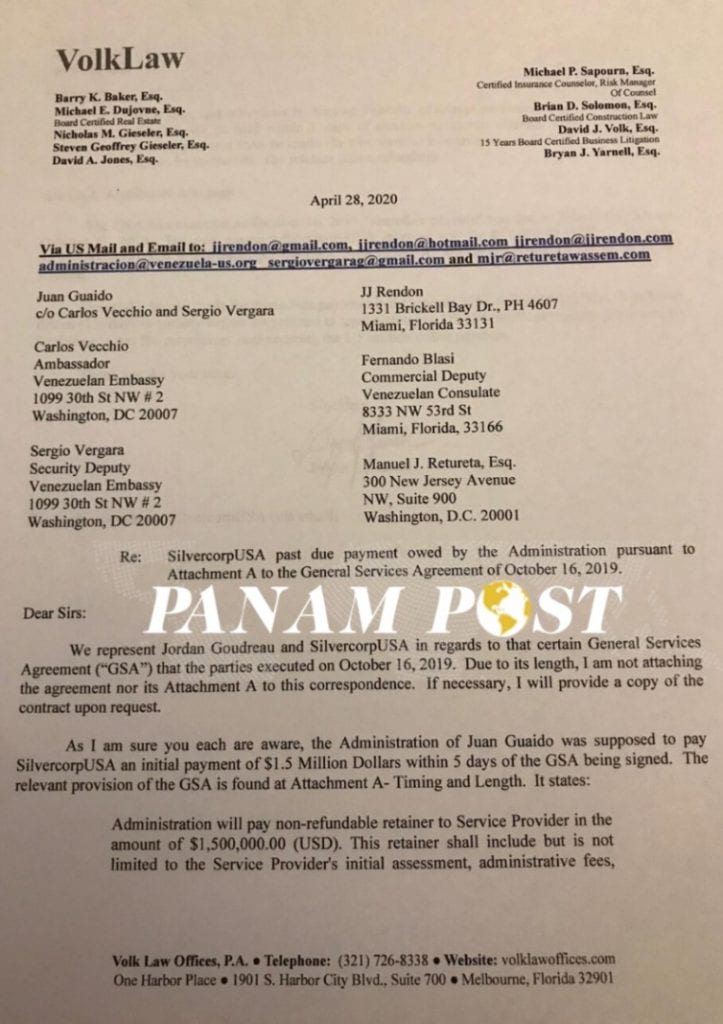
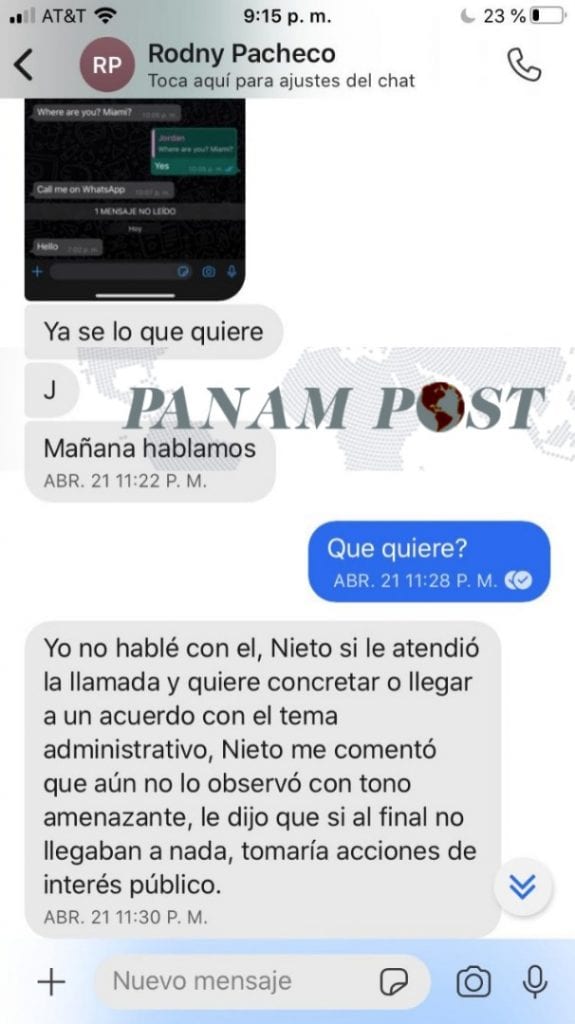
To the slaughterhouse
“We want to make it public and report to the national and international community that in the early hours today, May 3, 2020, a group of terrorist mercenaries attempted to carry out an invasion by sea.”
That phrase by Reverol upset the interim government and the rest of the Venezuelan people. For hours, there was speculation, and the very factors associated with Guaidó contributed to the noise. From decrying the events as a crude theater of the dictatorship to beginning to consider that the regime had, in fact, murdered brave Venezuelans who had ventured into a crude operation. President Guaidó’s first reaction was to say that it was all “a new plot of the dictatorship.”
When Nieto Quintero and Goudreau realized the evident failure of the raid in Macuto, they decided to publish a video admitting their role in the efforts to encourage other officers. The presence of an American and a respected military officer, such as the captain of the Bolivarian National Guard, should serve to encourage others to accompany the military initiative. However, that did not happen. The regime controlled the situation and overcame the threats. That night, Goudreau spoke out.
“On Sunday, Jordan Goudreau walked into a crisis. He asked to speak to Patricia Poleo because he knew she was the most radical journalist and because of the respect she commands from the military and the Venezuelan diaspora,” says one of the sources, who was accompanying Goudreau that day.
The mercenary explained everything to Patricia Poleo: “There is a contract with the interim government, and the contract has been violated. That is why I can now break the previous confidentiality.”
Goudreau’s statements to Poleo are replete with inconsistencies. He says that no one in the interim government ever paid him when, in fact, Rendón did give him 50,000 USD. He also reveals the exact number of men involved in the operation (he says there are barely 60). And he claims that he has just spoken to some military personnel who, in reality, the dictatorship had killed hours earlier.
But there was one detail in Goudreau’s words that few picked up on: “At this point, the contract was completely broken. Nothing was fulfilled. I mean, there really is no contract anymore.” The last bit is what the representatives of the interim government actually subscribe to.
The next day, the Nicolás Maduro regime neutralized two other incursion efforts in Venezuela. He was able to arrest more than ten military personnel and other candidates who had joined them. Two Americans, also trained in Iraq and Afghanistan, even ended up in the prisons of Chavismo. “Something never seen before in Latin America,” a military source told the PanAm Post.
At this point, none of the sources consulted can explain why an operation destined to fail was executed and by whom. Chavismo was already alert and the operation did not have the necessary resources or logistics. Nor did it have the backing of the interim government, which flirted with the project for a few months. Nevertheless, Jordan Goudreau decided to send his men to the slaughterhouse. Today, Chavismo is exhibiting them as a trophy.
 Versión Español
Versión Español












